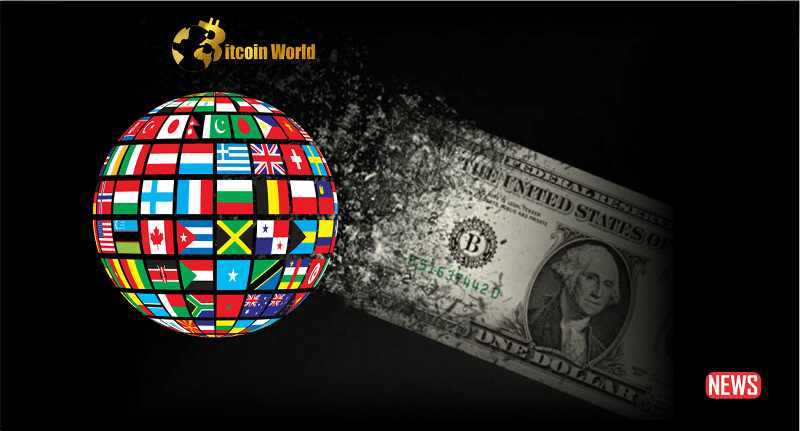The global economic landscape is shifting, and the once undisputed reign of the US dollar is facing unprecedented scrutiny. Economist Peter St. Onge has recently ignited a fiery debate with his stark warning: the dollar is facing a “stunning collapse” due to accelerating de-dollarization. Is this alarm warranted, or is it simply another economic forecast in a sea of predictions? Let’s dive into the details and explore what this potential shift could mean for you and the global economy.
Is De-Dollarization Really Happening? The Numbers Speak
St. Onge points to a significant trend: the declining share of the US dollar in global reserves. While the dollar remains a major player, its dominance isn’t what it used to be. Consider this:
- A Significant Drop: In 2001, a hefty 73% of global reserves were held in US dollars. By 2021, this figure had shrunk to 47%, according to St. Onge.
- Losing Ground to Others: Interestingly, in a single year, the dollar’s share fell by 8 percentage points, while the Chinese yuan’s market share increased.
This data suggests a tangible shift, but what’s driving this change?
The Sanctions Spark: Are US Actions Fueling the Fire?
St. Onge argues that US sanctions are a major catalyst in this de-dollarization trend. The freezing of $300 billion in Russian central bank assets after the Ukraine war has sent a clear message to other nations:
- Sanctions as a Double-Edged Sword: While sanctions are intended to exert pressure, they also highlight the potential risk of relying heavily on a currency controlled by a single nation.
- Seeking Alternatives: As countries become wary of being on the receiving end of such measures, they are actively seeking alternatives to the dollar for trade and reserves.
What are the Alternatives? Gold, the Euro, and Beyond
So, where are nations turning? St. Onge highlights a few key contenders:
- The Timeless Appeal of Gold: Gold has historically been a safe haven asset and a reliable store of value, making it an attractive alternative during times of economic uncertainty.
- The Euro as a Regional Powerhouse: The Eurozone represents a significant economic bloc, and the euro offers a viable alternative for trade and reserves, particularly for European nations and their partners.
The Rise of BRICS and a New Global Currency
Another significant development is the growing influence of the BRICS nations (Brazil, Russia, India, China, and South Africa). This alliance is actively exploring the creation of a new currency independent of the US dollar.
Why is this important?
- Reducing Dollar Dependence: A BRICS currency would allow member nations to conduct trade and financial transactions without relying on the dollar.
- Increased Geopolitical Influence: This move could significantly shift the global economic balance of power.
- Growing Membership: With at least six more nations considering joining BRICS, the potential impact of this alternative currency is substantial.
Argentina’s Move: A Sign of Things to Come?
Recent news further underscores this trend. Argentina, facing economic challenges, has decided to pay for Chinese imports in yuan instead of US dollars. This decision highlights the practical implications of de-dollarization for individual nations.
The Potential Impact on Your Wallet: What Does This Mean for Americans?
St. Onge paints a concerning picture for the average American if the de-dollarization trend continues. His predictions include:
- Skyrocketing Inflation: A weakening dollar could lead to increased import costs, driving up inflation and eroding purchasing power.
- A Declining Standard of Living: As the dollar’s global influence diminishes, the cost of goods and services could rise, impacting the overall standard of living.
- The US Losing its Global Standing: The dollar’s status as the world’s reserve currency has given the US significant economic and political leverage. De-dollarization could diminish this influence.
Is a Complete Collapse Imminent? Considering the Counterarguments
While St. Onge’s warnings are stark, it’s important to consider other perspectives. The dollar still possesses significant advantages:
- Deep and Liquid Markets: US financial markets are the largest and most liquid in the world, making the dollar attractive for investors.
- Global Trade Dominance: Many commodities and goods are still priced and traded in US dollars.
- Lack of a Clear Alternative: While the euro and a potential BRICS currency are emerging, no single currency currently possesses the scale and stability to fully replace the dollar.
Navigating the Shifting Sands: What Can Be Done?
Regardless of the speed of de-dollarization, it’s crucial to understand the potential implications. Here are some key considerations:
- Diversification is Key: For individuals and nations alike, diversifying investments and currency holdings can help mitigate risk.
- Monitoring Global Trends: Staying informed about global economic shifts and geopolitical developments is crucial for making informed decisions.
- Policy Adjustments: For the US, addressing concerns about sanctions and maintaining sound fiscal policy will be vital in preserving the dollar’s standing.
The Future of the Dollar: A Gradual Shift or a Sudden Shock?
The question isn’t necessarily if de-dollarization is happening, but rather the pace and magnitude of this shift. While a complete and immediate collapse of the US dollar might be unlikely, the trends suggest a gradual erosion of its dominance. The actions taken by the US and other global powers in the coming years will undoubtedly shape the future of the international monetary system.
Ultimately, understanding the forces driving de-dollarization is essential for navigating the evolving global economic landscape. Whether it leads to a dramatic collapse or a more gradual transition, the implications for individuals, businesses, and nations are significant and warrant careful attention.
Disclaimer: The information provided is not trading advice, Bitcoinworld.co.in holds no liability for any investments made based on the information provided on this page. We strongly recommend independent research and/or consultation with a qualified professional before making any investment decisions.


